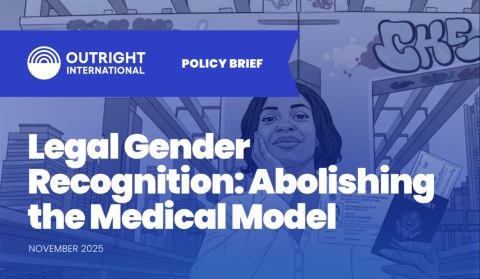
Report
Legal Gender Recogniton: Abolishing the Medical Model
Region(s)
TOPIC(s)
Author(s)
Outright Team
Publish Date
November 20, 2025
Share
Requiring a person to carry identity documents that do not match their gender identity exposes them to the risk of violence and discrimination. Every person should be able to have their self-determined gender identity recognized by law. Trans, nonbinary, and intersex people must be able to enjoy this right free from medical, judicial, and other restrictions.
Key Points in Outright International's Legal Gender Recognition Policy Brief:
- Legal gender recognition refers to the process through which a person’s gender identity is formally acknowledged by the state in official documents.
- When people can update their legal documents to reflect who they are, they are less likely to face discrimination, danger, or disrespect. This is especially important for trans, nonbinary, gender-diverse people, and some intersex people.
- Human rights standards call for states to ensure that legal gender recognition procedures are quick, transparent, accessible, and based on self-determination.
- Several countries implement a “medical model,” which conditions gender marker changes on requirements such as surgery, sterilization, or psychiatric diagnosis. This violates human rights and undermines bodily autonomy.
- Good practices affirm that legal gender recognition should not depend on a person’s medical history, medical or mental health treatment, or appearance, and must be accessible regardless of sexual orientation, gender identity, gender expression, sex characteristics, marital status, or parental status.

Explore News and Commentaries
We share news, cultural media and advocacy of partners, activists and experts through the lens of LGBTIQ people working on international human rights.
Read Our Insights